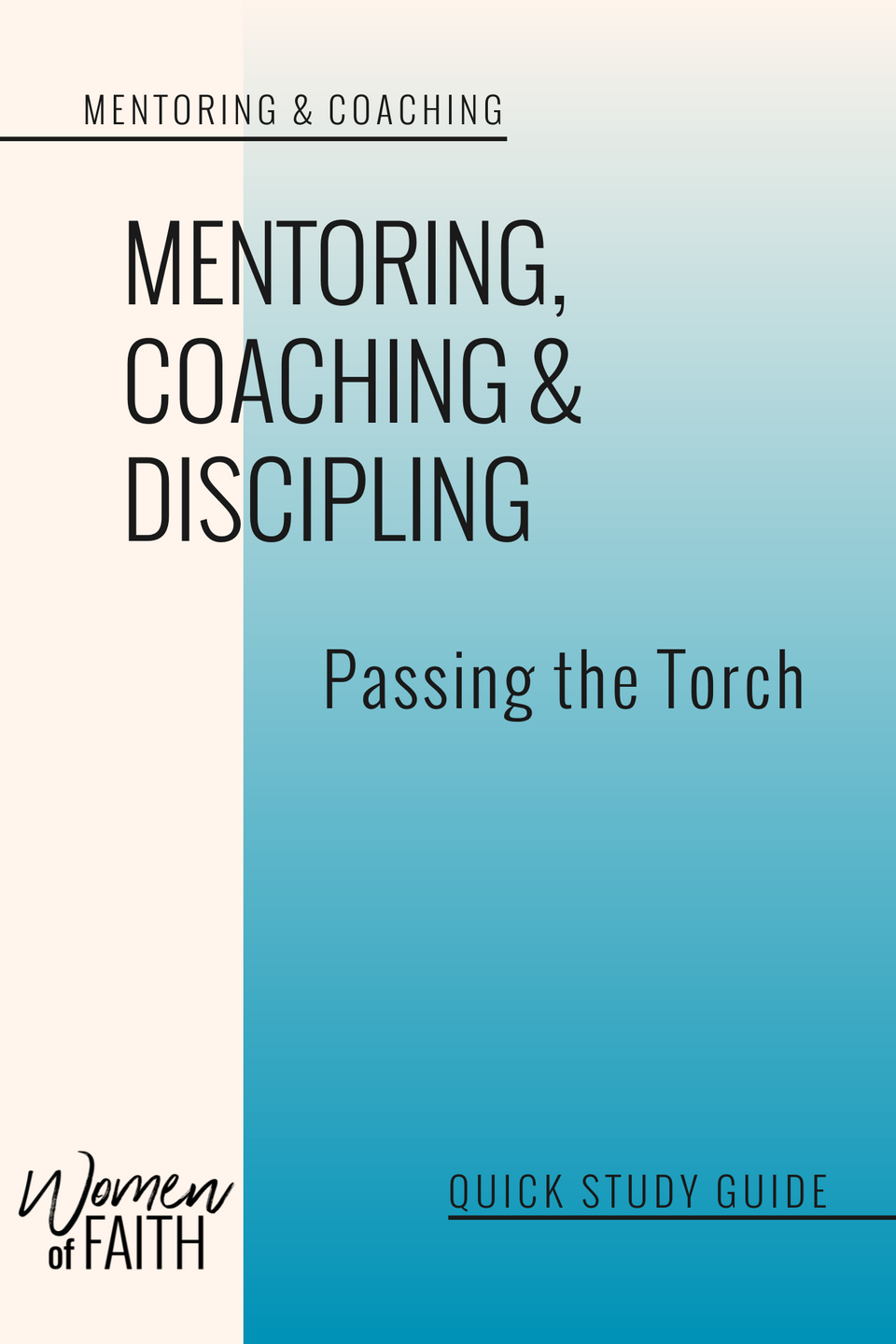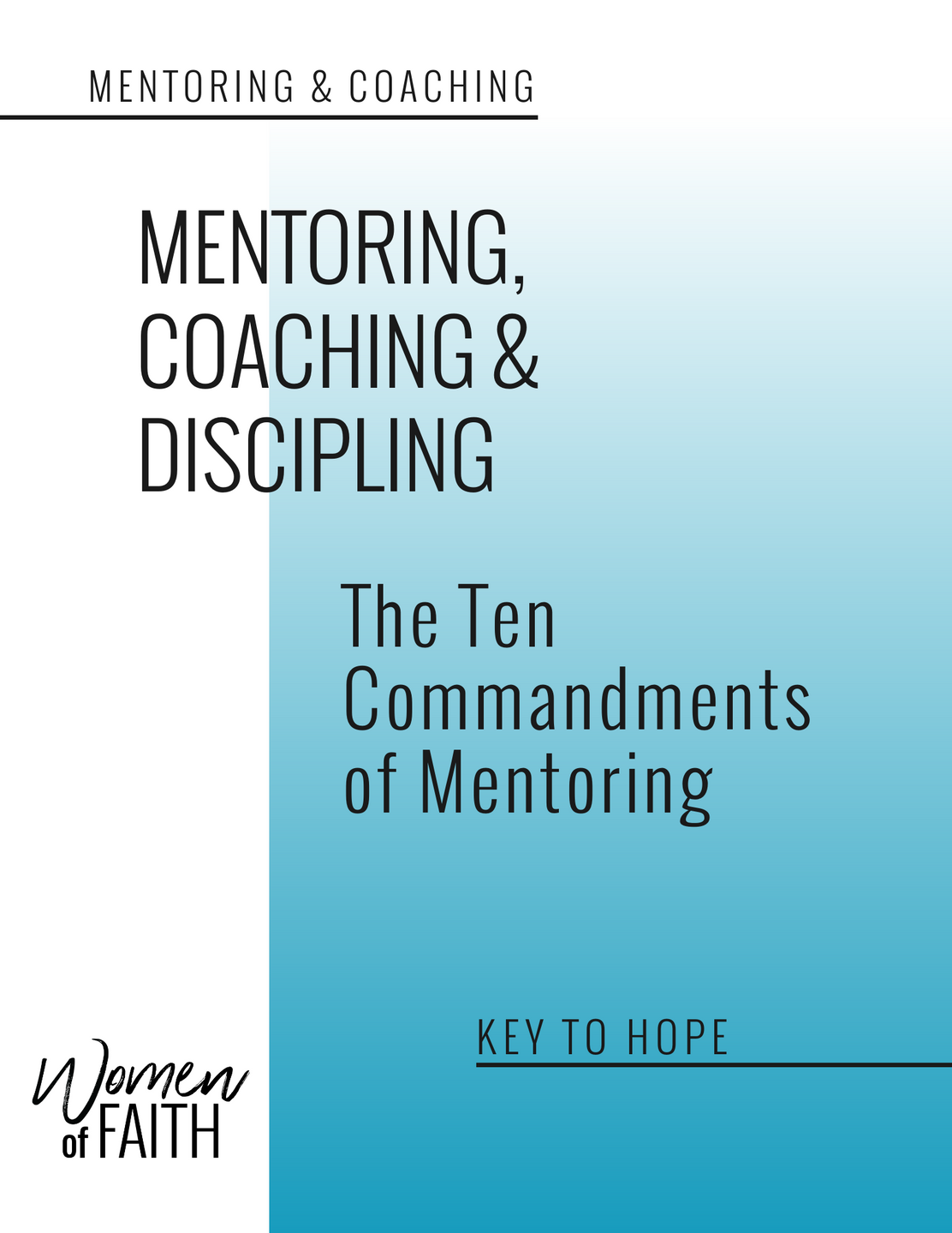MENTORING, COACHING & DISCIPLING

QUICK STUDY GUIDE
Need help now with MENTORING, COACHING & DISCIPLING?
This Quick Study Guide contains excerpts from our Keys For Living book on MENTORING, COACHING & DISCIPLING, to offer an immediate overview, concise answers, with biblical hope and practical help.
PASSING THE TORCH
“Therefore, if anyone is in Christ, he is a new creation. The old has passed away; behold, the new has come.”
2 Corinthians 5:17
Most of us need help understanding how to live the life God offers. God recognizes that we need help in order to grow. One method He uses is mentoring, coaching or discipleship. Mentoring occurs when a more mature Christian trains and teaches others who are less mature. When we are new in the faith, we are often considered to be “baby Christians” and constantly have need to lean on others to grow. If we have been “slow to learn,” we need to be moved from feeding on milk to feeding on meat or solid food. Helping to make that transition is a significant role of a mentor. When becoming a Christian, you become a new person. You leave behind your old way of doing things and find yourself being transformed by God’s Spirit to live a radically new life! Even so, most of us need help understanding how to live the life God offers.
“In fact, though by this time you ought to be teachers, you need someone to teach you the elementary truths of God’s word all over again. You need milk, not solid food! Anyone who lives on milk, being still an infant, is not acquainted with the teaching about righteousness. But solid food is for the mature, who by constant use have trained themselves to distinguish good from evil.”
(Hebrews 5:12–14)
Practical Tools and Resources to Go Deeper!

NOT SURE ON HOW TO START?
LEARN: THE TEN COMMANDMENTS OF MENTORING
Get your free Key to Hope on Mentoring. The download will be sent to your email.
WOMEN OF FAITH SHOW with ALITA REYNOLDS
Inspiring conversations that will encourage you to live the life you were created for.
Do you want to experience a deeper relationship with Jesus?
Do you need some encouragement that your story has a purpose?
Join Alita Reynolds, the President of Women of Faith, as she and her featured guests inspire you to live the life you were created for and equip you to walk more fully in God’s purpose for your life.
Whatever your story, your life matters, you belong, and God wants you to live victoriously. You’ll meet a wide range of guests who impact the kingdom in meaningful ways every day. Their stories will inspire you to believe that when we walk by faith, ANYTHING is possible.
INTERESTED IN BECOMING A CERTIFIED CHRISTIAN LIFE COACH AND COACHING OTHERS?
Do you have a heart to see others grow personally and professionally… to set and reach their goals, maximize their potential, and step more fully into their God-given calling? Join a Premiere Network of Like-minded Christian Life Coaches.
COLLECTION OF CLASSES
Take a deep dive into complete and comprehensive teaching.
Learn with our collection of classes found by subscribing today PLUS receive so much more.
Our Women of Faith Collection of Classes are designed to help you and those you care about deepen your relationship with Jesus and make practical changes in your life. Sign up to watch the Women of Faith Collection of Classes at LIFTABLEtv and start moving toward the FREEDOM you crave.
Whatever you’re facing, your life matters, and God wants you to live in victory. Today is a great day to begin.
What Is a Disciple and What Is a Mentor?
- A disciple is one who learns to follow the teaching and training of another.
- The Greek word for “disciple” is mathetes, which means “a learner.”
- The derivative word math originally meant “to teach, learn or disciple.”
- A mentor builds a relationship with a less knowledgeable disciple in order to help the disciple grow in theoretical and practical knowledge and understanding.
- The Greek word for “mentor” is didaskalos, which means “teacher.”
- The goal of the mathetes (student) is to be like the teacher.
- The carpenter’s mathetes (apprentice) learns his carpentry by example and experience.
“A student is not above his teacher, but everyone who is fully trained will be like his teacher.”
(Luke 6:40)
What Is Mentoring?
- Mentoring is the commitment of one person to equip another for personal growth and ministry.
- Mentoring equips disciples by means of teaching and training—and by example.
- Mentoring involves …
- … more than just teaching - training
- … more than facts - philosophy
- … more than formality - fellowship
- … more than information - transformation
- … more than learning - living
- … more than parroting the teacher - perpetuating
Discover the Joy of Coaching and Mentoring
- Demonstrate by example how the Christian life is lived.
- Disciplined life.
- Seeking God’s will.
- Servant’s heart.
- Love for people.
- Ongoing study of Scripture.
- Fellowship with other Christians.
“Don’t let anyone look down on you because you are young, but set an example for the believers in speech, in life, in love, in faith and in purity.”
(1 Timothy 4:12)
- Detail a reasonable plan for reaching goals.
- Detail in writing what the disciple should do.
- Demonstrate how to do it.
- Ask your disciple to write out plans in your presence for reaching a goal.
- Later, for accountability, review what was done during the week.
“An upright man gives thought to his ways.”
(Proverbs 21:29)
- Devise challenging activities to increase faith and confidence.
- Memorizing Scripture.
- Attending Bible studies and seminars.
- Attending church functions.
- Reading Christian biographies.
- Helping others.
“Direct me in the path of your commands, for there I find delight. Turn my heart toward your statutes and not toward selfish gain.”
(Psalm 119:35–36)
What Are Common Goals for Growth?
- Have a regular prayer life
- Have an effective Bible study
- Memorize and apply Scripture
- Have a biblical worldview
- Manage your money biblically
- Have unshakable faith in God
- Triumph over temptation
- Share your faith with others
- have a meaningful marriage
- Grow through grief
- Do meaningful mission work
- Learn the art of leadership
- Communicate with and/or confront others
- Mentor others
Do you have a mentoring relationship with someone who is helping you grow in your spiritual walk? Are you helping someone else grow in their walk with Jesus? By choosing to develop relationships to help others grow, you follow Paul’s counsel to Timothy when he said,
“And the things you have heard me say in the presence of many witnesses entrust to reliable men who will also be qualified to teach others.”
(2 Timothy 2:2)
What are characteristics of a mentor?
The apostle Paul was a true mentor of men. In 2 Timothy chapter 2 Paul gives a precise picture of a mentor. He describes the mentor as one who …
- Is strong in the grace of Jesus Christ. verse 1
- Discerns who are reliable disciples. verse 2
- Chooses those qualified to disciple others. verse 2
- Endures suffering like a good soldier. verse 3
- Desires to please the Lord. verse 4
- Obeys the rules. verse 5
- Works diligently. verse 6
- Makes sacrifices for the sake of God’s kingdom. verse 10
- Dies to self, lives for Christ. verse 11
- Refrains from arguments. verse 14
- Seeks God’s approval. verse 15
- Is unashamed of beliefs. verse 15
- Correctly handles Scripture. verse 15
- Avoids worthless conversation. verse 16
- Turns from evil. verse 19
- Prepares for God’s purposes. verse 21
- Pursues righteousness, faith, love and peace. verse 22
- Calls to the Lord with pure motives. verse 22
- Does not quarrel, but is kind to everyone. verse 24
- Is able to teach. verse 24
- Is not resentful. verse 24
- Is gentle with those who oppose. verse 25
- Trusts in God’s sovereign hand of salvation. verse 25
- Display unconditional love.
- Discover the potential of your disciples.
- Allow for setbacks.
- Show interest in their lives.
- Verbalize appreciation for them.
“Now that I, your Lord and Teacher, have washed your feet, you also should wash one another’s feet. I have set you an example that you should do as I have done for you.”
(John 13:14–15)
- Develop an intimate friendship.
- Be vulnerable.
- Be honest.
- Be willing to admit personal struggles.
- Be warm and affectionate.
“A man of many companions may come to ruin, but there is a friend who sticks closer than a brother.”
(Proverbs 18:24)
- Discern needs and fulfill them when you can.
- Encourage with phone calls and notes of praise.
- Extend physical and financial help.
- Include in social activities.
“He who despises his neighbor sins, but blessed is he who is kind to the needy.”
(Proverbs 14:21)
- Determine to pray daily for your disciple.
“Pray continually.”
(1 Thessalonians 5:17)
- Delight in the joy and growth you will experience through investing in the life of another.
“I have no greater joy than to hear that my children are walking in the truth.”
(3 John 4)
Successful coaching and mentoring is more than teaching or training. It is a transfer of life. If your priority is prayer, your disciple will prioritize prayer. If you have a servant’s heart, your disciple will seek a servant’s heart. The delight of coaching and mentoring is that your priorities in life will transform your disciple’s pattern of life.
LIVE IN VICTORY!
100+ BIBLICALLY BASED RESOURCE TOPICS
READY TO GO DEEPER?
Be coached and equipped to boost your spiritual strength, experience real relationships, and be the life leader you are.
Want to learn more about our other 100+ topics? Check out the Women of Faith Resources, to discover biblical hope and practical help on these topics. The Women of Faith Resources are designed to help you – and help you help others – overcome difficulties, grow in maturity, and move forward in life.
God desires to give you hope as you face life challenges, problems and difficult trials. The good news for us, God specializes in redemption and transformation. He takes that which was lost and restores it. He takes that which was dead and gives it life. He takes that which had no hope and rewrites its story. This is our God! As you pray today, ask God boldly to transform the thing inside you that you want to see changed forever!
Thank you for your interest and support in Women of Faith. We pray God will encourage, equip, and empower you with His life-changing truth.
RELATED TOPICS



